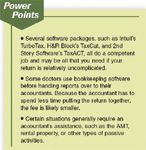Article
Should you do your own taxes?
Some doctors find it a rewarding challenge. We tell you when that challenge is worth meeting—and when it isn't.
Even if you know less about taxes than about Egyptian hieroglyphics, today's tax software packages can let you prepare your own return. The question is, should you?
The answer: It depends. Certain financial situations are sufficiently complicated that you really need an accountant's expertise. And, in many cases, the hours spent doing your own taxes could be more profitably spent seeing patients.
To help you decide whether or not to prepare your own tax return this year, we sought advice from tax experts as well as from doctors themselves. And we summed it all up in a checklist that you'll find.
If you receive a straight salary, own uncomplicated investments, and aren't subject to the alternative minimum tax, calculating your own taxes can be a straightforward exercise.
Family physician John Machata of North Kingstown, RI, certainly agrees. He does his own taxes using TurboTax Deluxe, and points out, "To prepare for an accountant, you need to gather your financial data anyway. By doing my return myself, the only extra work I do is to input the data into the computer. Perhaps I'm missing some opportunities for deductions, but I rather doubt it."
On the possibility of missing deductions, ob/gyn Fred Teichman of Lewisburg, PA, brings up another point: "With the AMT affecting so many these days, I'm not so sure what value it would be to get those 'extra' deductions anyway."
Doctors tell us that another reason for handling your own tax return is to maintain greater control over your finances. "It disciplines me to maintain good records through the year," says Teichman. Adds Douglas Butler, an FP and emergency physician from Crumpler, NC, "What makes the effort worthwhile is my improved understanding of investment and money-management decisions and how they impact taxes. Yes, I might make more per hour seeing patients, but in the long run I probably see greater economic gain from a better understanding of investment decisions and their tax consequences."
If you're tempted to do your own taxes, but feel insecure about giving up your accountant, a reasonable compromise might be the half-and-half approach that many doctors use. FP Rosanne J. Hooks of Mullins, SC, uses QuickBooks to keep her financial records and at the end of the year, hands over the reports to her accountant who completes the tax forms. "This way, I know what the numbers should look like. If my accountant forgets something, I'll notice the discrepancy."

When you need to call in an accountant
Certain situations or transactions are just too complicated, and you'd be far better off having an expert prepare your taxes. One of the major tax complications is the alternative minimum tax, which was originally designed to prevent taxpayers with high incomes from using deductions, credits, and other tax benefits to escape paying their fair share of taxes. But the AMT ensnares more people each year: even those who don't have high incomes or take many deductions. The IRS has a web tool available to help you determine whether you'll be affected. It's called "AMT Assistant" and it's available at apps.irs.gov/app/amt/. To use the program, you have to answer several questions and copy data from your Form 1040. It will only tell you whether you have to fill out Form 6251 (the AMT form) to see if you owe AMT. It doesn't calculate how much tax you owe.





